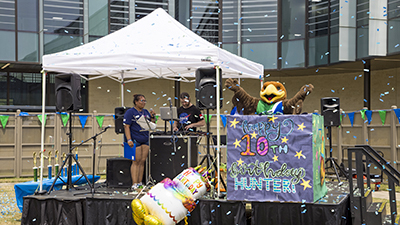Prof conducts impactful research on zoo animals and dog shelters to improve animal welfare

Humans can learn a lot from animals by studying their behavior. Dr. Angela Kelling, an associate professor of psychology at University of Houston-Clear Lake (UHCL), knows this from first-hand experience, as her main research interests lie in animal welfare. As the program director of UH-Clear Lake’s Behavioral Science Bachelor of Science program, she has conducted research on pedagogy and campus climate, and on improving the lives of animals in captivity through enrichment, training, and environmental design. Her past projects include African elephants, giant pandas, lions and tigers, and most recently, dog shelters.

Kelling’s journey into animal behavior research began during her student days at the Georgia Institute of Technology under the mentorship of the late Terry Lee Maple, a former professor and zoo director at Zoo Atlanta. It was Maple who encouraged her to delve into animal behavior, which led to her study on color vision discrimination in giant pandas, published by Learning & Behavior published in May 2006.
“A lot of the other research I did was on the welfare side and determining how I could improve the lives of animals,” she said. “We have these amazing animals in captivity, and that’s often the only way people can see these animals, so I wanted to make sure that while we’re housing them, we’re making their lives as good as possible.”
This desire sparked her interest in stereotypic behaviors, or behaviors with no discernable function, which led her to explore the relationship between cortisol and stereotypic swaying in African elephants at Zoo Atlanta for her dissertation. The Journal of Zoo and Aquarium Research published her findings in April 2024.
“Two elephants exhibited the swaying behavior, so with my dissertation, I wanted to determine if the swaying was calming them or if they were doing it out of boredom,” said Kelling. “For the elephant that swayed more, the cortisol level decreased, revealing that she swayed to calm herself.”
Her research also includes a case study of the effects of a visual barrier on the behavior of big cats housed at Zoo Atlanta. She evaluated the daily pacing patterns of two tigers and three lions in different housings. The results suggest that providing big cats in captivity with sensory access to their social partners can reduce stereotypic pacing behavior.

In addition to large zoo animals, Kelling spent time with the more familiar household companion: dogs. As part of one of Kelling’s courses at UH-Clear Lake, she taught a lab at BARC Animal Shelter & Adoptions in Houston. This experience inspired her to further examine the attitudes toward dog relinquishment via an online survey shared with more than 400 university students. Anthrozoös included an article about the survey in February 2021.
“I wanted to better understand what people think about relinquishment,” she said. “When do they blame the person vs. the dog? I wanted to come up with intervention ideas to prevent people from surrendering their dogs to shelters.”
She later wrote an article on exploring best practices in dog advertisements, which was published online in April 2024.
“There are many cute photos and playful descriptions about dogs up for adoption online, but what’s more important is providing information about the dogs’ behavior,” she added.
As a dog owner herself, Kelling is passionately committed to enhancing adoption practices and behavioral accommodations for dogs. She is currently planning further studies with her students, aiming to investigate screen processes and educational efforts by various rescues and shelters.
Kelling’s wealth of research and experience with wild and domesticated animals plays a role in her position as an associate professor and program director at UHCL. Sometimes she teaches an animal behavior course that brings her expertise to the classroom, but even when teaching other classes, she gives examples of her research, she said.
To learn more about UHCL’s Behavior Science program , contact hshadvising@uhcl.edu or 281-283-3333.










